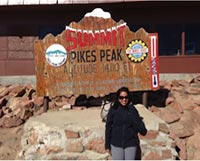
Name: Sunetra Das
Education: Ph.D. at the University of Oklahoma
Hometown:Calcutta, India
Career goal: Obtain a PhD, organize her own research lab and work as a professor.
Favorite Memory: Working as a team in the Mykles lab has been a great experience.
Project: RNASeq analysis of the blackback land crab (Gecarcinus lateralis).
Ecdysteroids are produced in the molting gland, the Y-organ, of crustaceans and regulate growth, reproduction and limb regeneration in the blackback land crab, Gercarcinus lateralis. The ecdysteroid titers fluctuate throughout the four different molt cycle stages. The broader question we want to address is: what are the molecular mechanisms regulating ecdysteroid biosynthesis in Y-organs. In other words, what signal transduction pathways are regulating molting and the transition between molting stages. Using pilot data we have identified two pathways: mTOR and TGF-beta/activin/Smad, that are implicated during early-premolt to mid-premolt and mid-premolt to late-premolt transitions, respectively.
To address these questions we have taken the approach of RNAseq analysis (sequencing of all mRNAs expressed in a cell or tissue at any given time). The general idea is to use next generation sequencing technology to generate large numbers of short sequences from all stages of the Y-organ. My project involves the assembly of short sequences into longer contiguous sequences to build a reference transcriptome. I am also working on annotation of a reference transcriptome via BLAST. This will provide us with information on what genes are being expressed in the tissue of interest. Further, we want to identifu the G.lat. orthologs of all the players involved in mTOR and TGF-beta pathways. In addition, we will use statistical tools to identify the differentially expressed transcripts in Y-organ transcriptomes, thereby, identifying novel regulators of molting.
The decapod crustaceans lack a fully sequenced genome. This limits the ability to study global changes in gene expression profiles with regard to experimental manipulation. Generating a well annotated reference transcriptome will help the crustacean biologists to gather sequence information on their genes of interest without the use of PCR cloning techniques. Further, the information generated from this project may be applied to study effects of environmental factors on arthropods that are ecologically and economically important.
